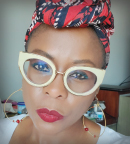When I got the call from the radiology department telling me I had to come back for a follow-up mammogram right before Christmas of 2020, I wasn’t surprised or initially concerned. I have dense breasts, and my first mammogram 2 years earlier had also detected suspicious areas in one of my breasts that turned out to be a false-positive. But this time, there was no denying that the two small masses in my left breast were indeed malignant. A biopsy of the tumors found that I had stage I—later upgraded to stage II—estrogen receptor–/progesterone receptor–positive, HER2-negative invasive lobular carcinoma.
Still, I was relieved the cancer was found at an early, treatable stage. At first, my surgical oncologist recommended a lumpectomy; however, when she explained that after removing both tumors and enough normal tissue for a clean margin, my breasts would have pronounced asymmetry, I considered having a prophylactic contralateral mastectomy instead. I was further convinced I should take a more aggressive treatment approach when—after advocating for additional testing—a magnetic resonance imaging scan found a small mass in my right breast. Although my radiologist and oncologist assured me the lesion did not appear to be malignant and it was reasonable to wait 6 months to see if there was a change in the nodule, I said an emphatic “no” and requested a tissue biopsy. When the results from the biopsy showed it was precancerous, after much prayer and discussions with my patient advocate, I knew a radical mastectomy was the best solution for me.

Having cancer has allowed me to live in a more positive space, and I’m happy to give back to the community that has given me so much.— Shannon Coleman, MA
Tweet this quote
Overcoming Racial Disparities
As a Black woman, I am well aware of the health and racial discrepancies between Black and White women with breast cancer. I know that despite medical improvements in the early detection, diagnosis, and screening of breast cancer, many Black women are less likely to receive adequate treatment compared with White women. And, although the incidence of breast cancer is similar between Black and White women in the United States, Black women are 42% more likely to die of the disease,1 a statistic that has remained the same for a decade.2 This has to change, and I was determined to do everything I could not to become part of that dismal statistic. But the road to recovery has not been easy.
Aftereffects of Breast Cancer
Although I had planned on having breast reconstruction surgery immediately after my mastectomy, I had to put it off for 6 months after blood clots formed in both lungs and I needed blood thinners to resolve them. I recently underwent DIEP (deep inferior epigastric perforators) flap breast reconstruction surgery; although I’m happy with the first phase of the process, it’s an adjustment to know that most likely I will never have sensation in my breasts or my abdomen, where tissue was removed and formed into breast shape.
Despite these issues, I’m grateful to be a cancer survivor. I’m also coping with early menopause from a combination of goserelin and anastrozole endocrine therapy, and the side effects, both physical and psychological, are brutal. The good news is my prognosis is excellent, and I remain cancer-free.
Being Present
We all know that death is part of life, but when you are actually faced with mortality, it gives you a different perspective on what it means to live every day as if it were your last. I realize I now have more years behind me than in front of me, and every second, every minute, and every hour of every day is more precious to me.
Having cancer has allowed me to live in a more positive space, and I’m happy to give back to the community that has given me so much. I am thankful to be involved with Carrie’s Touch (www.carriestouch.org/home), an advocacy organization for Black women with breast cancer. I also have a video blog of my recovery to let other survivors know that breast cancer doesn’t have to be an automatic death sentence, and that it is possible to have a full and rewarding life after a cancer diagnosis.
However, I admit, I’m still working through how cancer might impact my life in the long term. I recognize that having cancer is a lifelong journey, and there are psychological aspects of having this disease that haunt me. Like everyone facing a serious illness, I don’t know what the future holds.
When you are a cancer survivor every day is different. I’m just trying to live my best life every day, because this day may be all I have.
Ms. Coleman is Chief of the Office of Civil Rights at the California Department of Rehabilitation. She lives in Sacramento.
Editor’s Note: Columns in the Patient’s Corner are based solely on information The ASCO Post received from patients and should be considered anecdotal.
REFERENCES
1. Yedjou CG, Sims JN, Miele L, et al: Health and racial disparity in breast cancer. Adv Exp Med Biol 1152:31-49, 2019.
2. American Cancer Society: Cancer Facts & Figures for African Americans 2019–2021. Available at www.cancer.org/content/dam/cancer-org/research/cancer-facts-and-statistics/cancer-facts-and-figures-for-african-americans/cancer-facts-and-figures-for-african-americans-2019-2021.pdf. Accessed on January 27, 2022.

